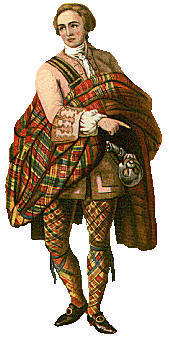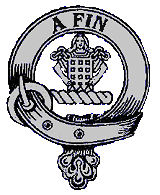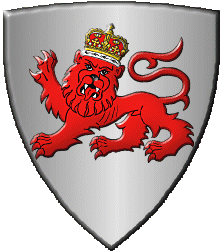Clan Ogilvy
Associated
Family Names:
Airlie, Findlater, Gilchrist, Macgilchrist, Milne,
Richardson, Storie.
THE NAME
The lands of Ogilvy are in Angus. The name derives from the Gaelic, Ocel-fa
meaning high plain. Angus was a kingdom in Pictish times ruled by a mormaer,
one of the ancient Celtic nobles of Scotland. Originally a mormaer, literally
a great steward, was a semi-independent sub-king. After the feudalising of
Scotland in the time of King David, mormaers came to be called earls. In those
day of course there were no dukes or marquesses, so earl was the highest rank
in the nobility.
Gillebride,
Earl of Angus in the time of King David I, gave the lands of Ogilvy to his
third son, Gilbert, some time before 1172, when Gilbert had a charter of Ogilvy,
Powrie and Kyneithen, all in Angus. His grandson, Sir Patrick de Ogilvy of
Wester Powrie appears on the Ragman Roll of nobles swearing fealty to Edward
I of England in 1296.
SHERIFF
OF ANGUS
The Ogilvies, by
the marriage in about 1320 of Patrick, son of Sir Patrick above, of Wester
Powrie to Isabel the heiress of Robert Ramsay of Auchterhouse, became hereditary
sheriffs of Angus in the fourteenth and fifteenth centuries. When in the 1430s
Sir Patrick Ogilvy of Auchterhouse commanded the Scottish forces fighting
with Joan of Arc against the English, he was styled Vicomte d’Angus.
This was not ‘viscount’, a peerage title not yet invented, but the
Latin word 'vicecomes', meaning sheriff. The family of Auchterhouse ended
in an heiress, who married ‘Hearty’ Sir James Stewart Earl of Buchan.
Sir Walter Ogilvy
of Lintrathen, younger son of Sir Walter Ogilvy of Wester Powrie and uncle
of Sir Patrick mentioned above, was appointed Lord High Treasurer of Scotland
under James I in 1425. In 1430, he was an ambassador to England, and four
years later attended Princess Margaret on her marriage to the Dauphin, heir
of the throne of France. He had numerous sons; from John the elder son of
his first marriage, descend the Ogilvies of Airlie; from Walter the eldest
son of his second marriage, the Earls of Seafield and Deskford.
OGILVY
OF AIRLIE
His eldest son,
Sir John Ogilvy of Lintrathen received a charter to the castle and lands of
Airlie in 1459. Sir John’s son, Sir James Ogilvy of Airlie, was appointed
ambassador to Denmark in 1491 and advanced to the ranks of peerage as Lord
Ogilvy of Airlie in the same year. The 7th Lord Ogilvy of Airlie was created
Earl of Airlie on 2nd April 1639.
The family was to
suffer much in the service of the Stuart monarchs. The earl and his sons joined
Montrose to oppose the enemies of Charles I, and the earl fought with distinction
at Montrose's victory at Kilsyth. Sir
Thomas, the earl's second son, raised his own regiment to fight the royalists,
but was killed at the scene of another Montrose’s victories, at Inverlochy,
in February 1645.
The eldest son,
Lord Ogilvy, was with Montrose at Philiphaugh when the Marquess was surprised
by a strong force of Covenanter cavalry under General Lesley. Ogilvy begged
Montrose to flee, as he was the only person who could rally the king’s
supporters. Montrose escaped, but Ogilvy was captured. He awaited execution
in the grim castle at St Andrews, where his sister came to say her last farewell.
She exchanged clothes with her brother, who passed in her place, unnoticed
by the guards. He lived to inherit his father’s earldom and to see the
Restoration.

The Ogilvies
rallied to the Stuart cause in the following century, joining the Earl of
Mar in 1715. Lord Ogilvy was attainted, but was allowed to return home in
1725. His titles were not restored and he died in 1730, when his younger brother,
John, assumed the style, ‘Earl of Airlie’. His son, David, raised
a regiment comprised mostly of Ogilvies to fight for the ‘Young Pretender’
in 1745.
After the defeat,
Ogilvy escaped to France, entering royal service there and obtaining the rank
of general. It was not until 1796 that an Act of Parliament confirmed the
restoration of the earldom to another David, the sixth Earl. His son, David,
the seventh Earl, was a Scots representative peer from 1850 to 1881. He was
created a Knight of the Thistle. The chief’s seat is at Cortachy Castle.
The present chief,
as did his father, served as Lord Chamberlain to HM The Queen. This royal
link was reinforced in when the Honourable Angus Ogilvy, the chief’s
brother, married HRH Princess Alexandra.
OGILVY
OF FINDLATER
Walter Ogilvy the
eldest son of Walter of Lintrathen by his second wife married Margaret heiress
of Sir John Sinclair of Deskford and Findlater. His descendant in the sixth
generation, another Sir Walter of Deskford and Findlater was created Lord
Ogilvy of Deskford on 4th October 1615.
His son was created
Earl of Findlater on 20th February 1638. As he had no sons surviving, he obtained
a patent that the earldom should be inherited by his son-in-law, Patrick Ogilvy
of Inchmartine, who was descended from the second son of Sir Alexander of
Auchterhouse, the eldest brother of Sir Walter of Lintrathen.
James Ogilvy, son
and heir of the third Earl of Findlater, was created Earl of Seafield in 1701
during his father’s lifetime. Seafield was a prominent unionist, and
promoted the Act of Union of 1707. In 1711 the Earl of Seafield inherited
his father’s title of Findlater. The Seafield title can descend to heirs
of line, so that while the earldom of Findlater is either dormant or extinct,
the earldom of Seafield still exists.
A MARTYR
The family name
is also renowned in Scotland’s religious history. Born in Banff in 1579,
a cadet of Ogilvy of Findlater, John Ogilvie was a Jesuit priest who entered
Scotland in 1614 disguised as a soldier and worked in central Scotland. He
was arrested and hanged at Glasgow Cross in 1615 for his defence of the spiritual
supremacy of the papacy. He was beatified in 1927 and canonised in 1976. He
is still the only officially recognised martyr in post-Reformation Scotland.
 ARMS
OF OGILVY
ARMS
OF OGILVY
The Ogilvy coat of arms is that of the ancient earls of Angus, viz: Argent
a lion passant guardant Gules crowned with an imperial crown Or. The Airlie
lion is also collared with an open crown or, but the Seafield lion is not.
The Earls of Seafield carry the Ogilvy lion in the first and fourth quarters
of their first and fourth grand quarters, with the second and third quarters
being Sinclair, ie Argent a cross engrailed Sable, the second and third
grand quarters are Grant, Gules three antique crowns Or.